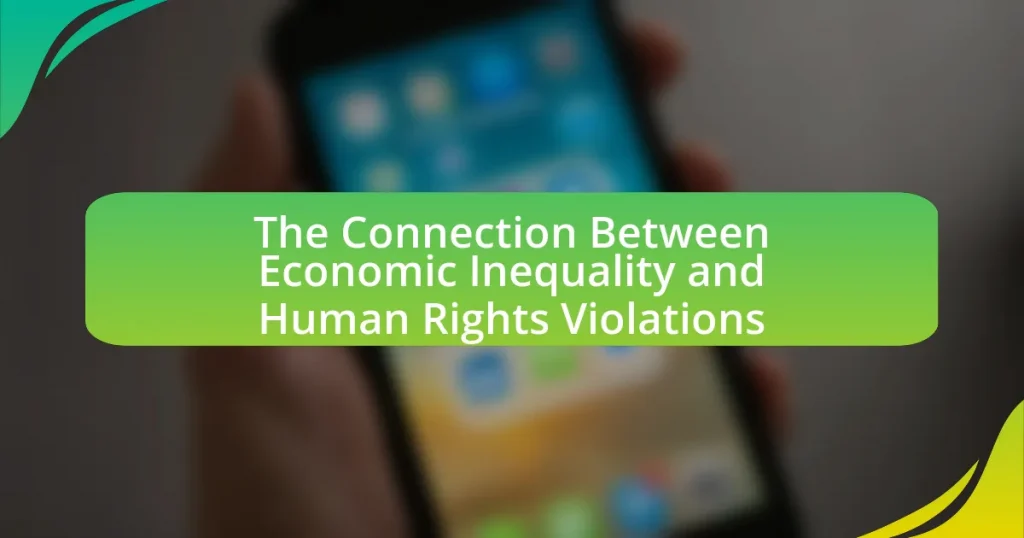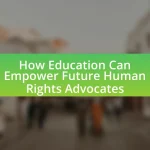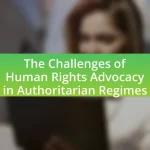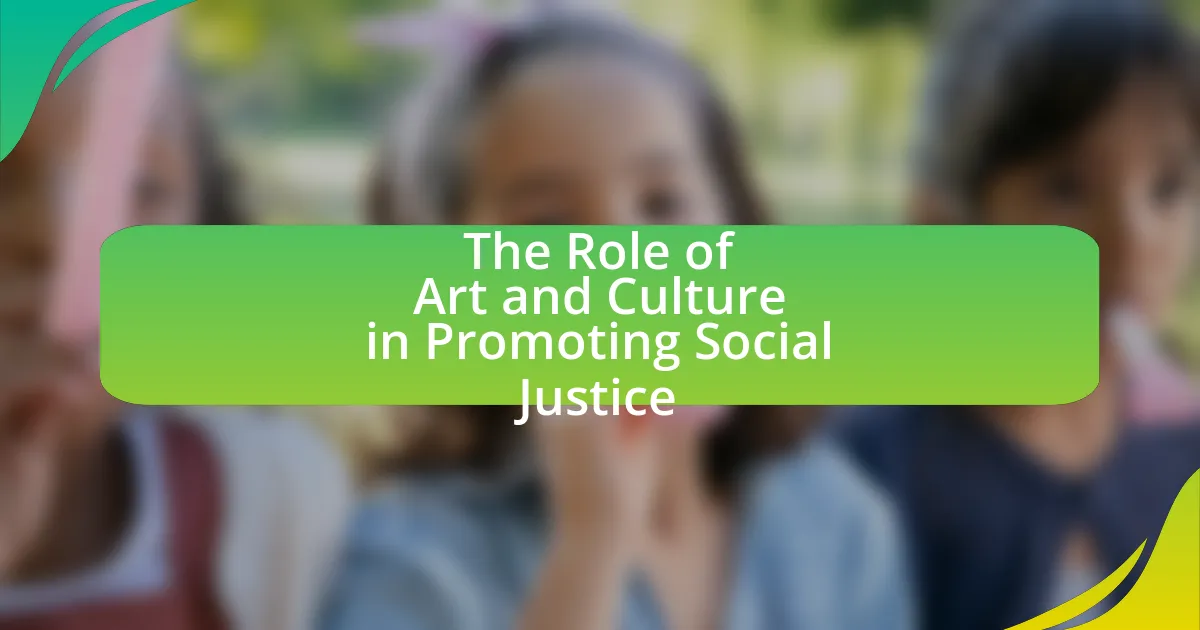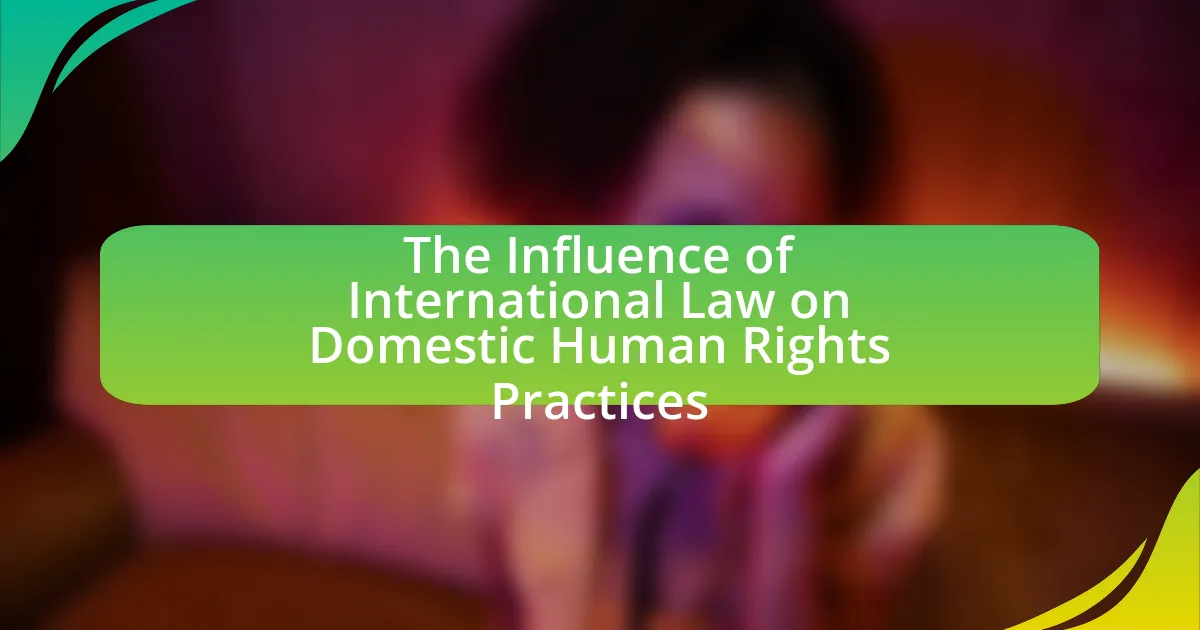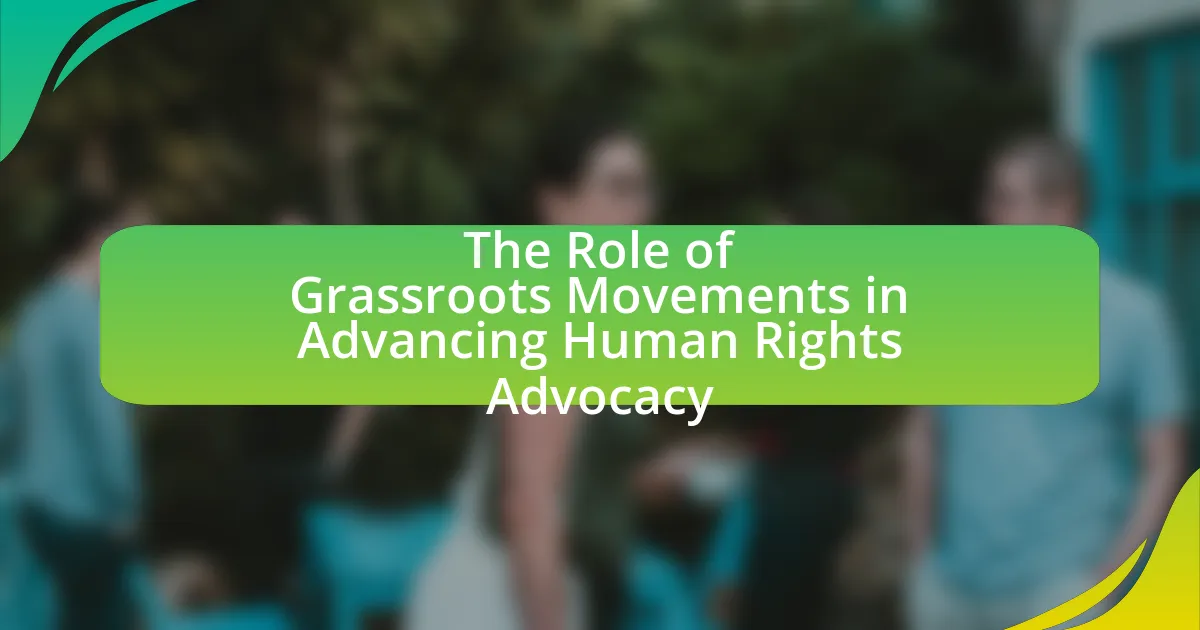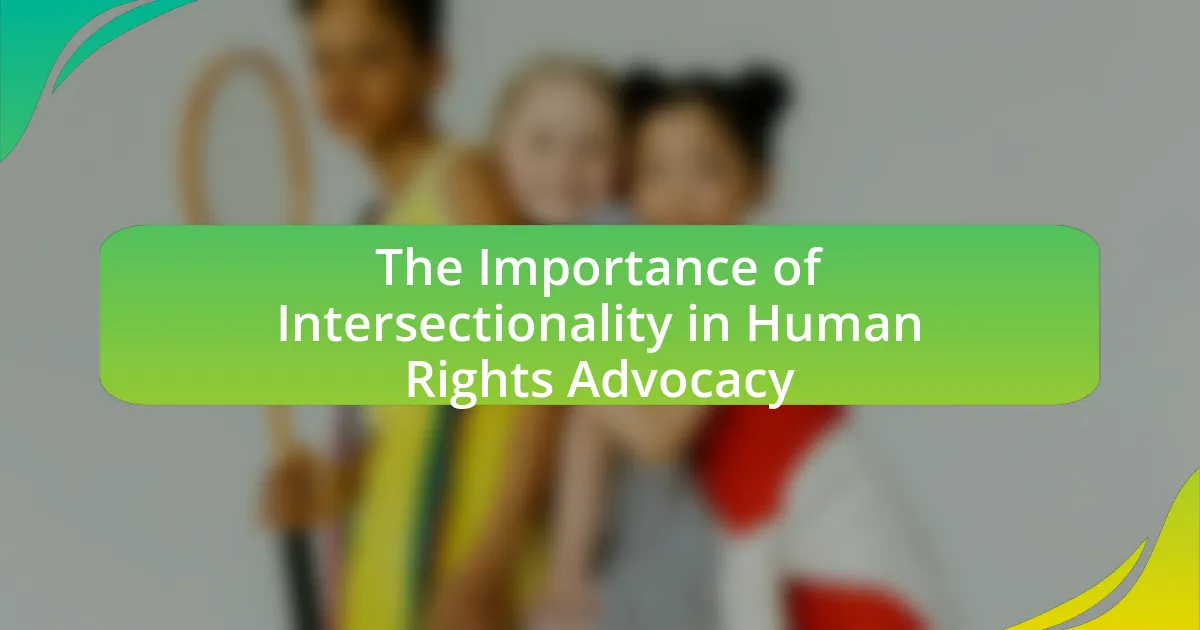The article examines the connection between economic inequality and human rights violations, highlighting how disparities in wealth lead to systemic injustices that undermine access to essential services and opportunities for marginalized groups. It discusses key indicators of economic inequality, such as income and wealth distribution, and their direct correlation with human rights abuses, including limited access to education and healthcare. The article emphasizes the role of government policies in perpetuating or mitigating these inequalities and explores successful strategies implemented by various nations to address these issues. Additionally, it outlines the importance of advocacy and education in combating economic disparities and promoting human rights.
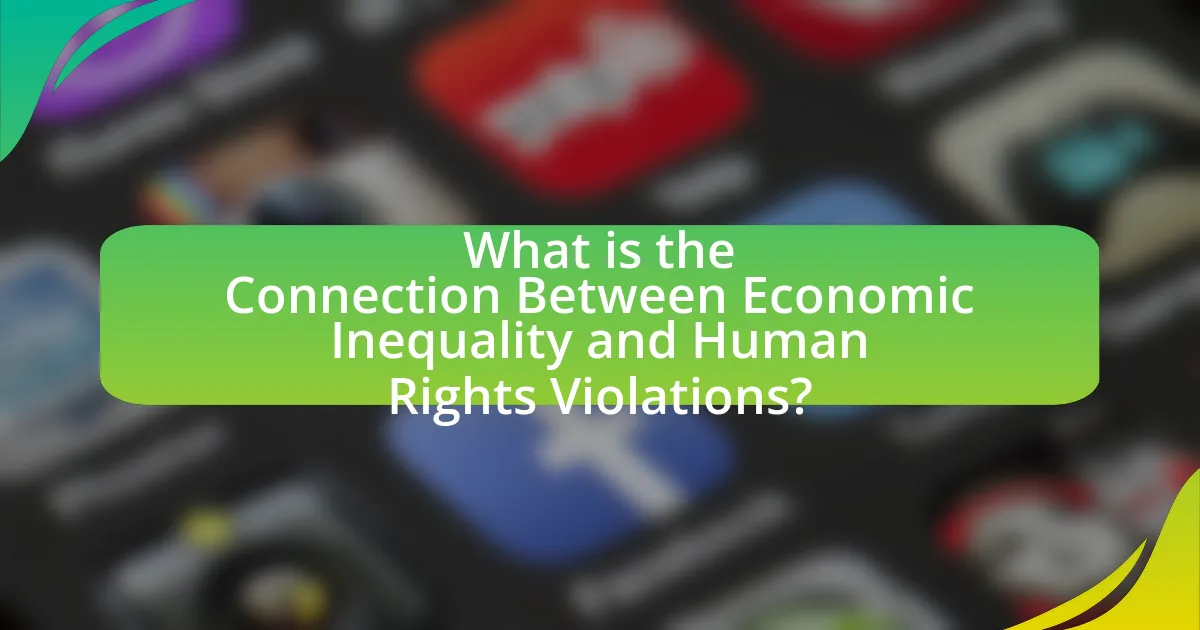
What is the Connection Between Economic Inequality and Human Rights Violations?
Economic inequality significantly contributes to human rights violations by creating disparities in access to resources, opportunities, and basic services. When wealth is concentrated in the hands of a few, marginalized groups often face discrimination, lack of political representation, and inadequate access to education, healthcare, and legal protections. For instance, the United Nations Development Programme (UNDP) has reported that countries with high levels of income inequality experience higher rates of social unrest and violence, which can lead to systematic abuses of human rights. Additionally, the World Bank has found that economic inequality can hinder social mobility, perpetuating cycles of poverty and exclusion that violate the rights of individuals to live with dignity and security.
How do economic inequality and human rights intersect?
Economic inequality directly impacts human rights by limiting access to essential services and opportunities for marginalized groups. When wealth is concentrated in the hands of a few, it often results in systemic barriers that prevent equitable access to education, healthcare, and legal protections. For instance, the United Nations Development Programme (UNDP) highlights that countries with high economic inequality tend to experience higher rates of poverty and lower levels of social mobility, which can lead to violations of rights such as the right to an adequate standard of living and the right to participate in cultural life. Furthermore, research from the World Bank indicates that economic disparities can exacerbate social tensions, leading to civil unrest and further human rights abuses. Thus, the intersection of economic inequality and human rights is characterized by a cycle where inequality fosters rights violations, and these violations can perpetuate further inequality.
What are the key indicators of economic inequality?
Key indicators of economic inequality include income distribution, wealth distribution, poverty rates, and access to education and healthcare. Income distribution is often measured using the Gini coefficient, which quantifies income disparity within a population; a Gini coefficient of 0 represents perfect equality, while a coefficient of 1 indicates maximum inequality. Wealth distribution highlights the concentration of assets among the wealthiest individuals, often illustrated by the share of wealth held by the top 1% compared to the rest of the population. Poverty rates indicate the percentage of individuals living below the national poverty line, reflecting economic disparities. Access to education and healthcare serves as a critical indicator, as unequal access can perpetuate cycles of poverty and limit opportunities for upward mobility. These indicators collectively illustrate the extent of economic inequality and its implications for social justice and human rights.
How do these indicators relate to human rights?
Indicators of economic inequality, such as income disparity and access to resources, directly relate to human rights by highlighting systemic injustices that undermine individuals’ rights to equality, dignity, and opportunity. Economic inequality often leads to violations of civil, political, and social rights, as marginalized groups face barriers to education, healthcare, and fair employment. For instance, the United Nations Development Programme reports that countries with high income inequality tend to experience higher rates of poverty and lower levels of social mobility, which correlate with increased human rights violations. This evidence illustrates that economic indicators are critical in assessing the state of human rights within a society.
Why is understanding this connection important?
Understanding the connection between economic inequality and human rights violations is crucial because it highlights how disparities in wealth can lead to systemic injustices and the erosion of fundamental rights. Research indicates that countries with high levels of economic inequality often experience increased rates of human rights abuses, as marginalized groups lack the resources and power to advocate for their rights effectively. For instance, the United Nations Development Programme has documented that economic inequality can exacerbate social tensions, leading to violence and discrimination against vulnerable populations. This understanding is essential for policymakers and activists aiming to address both economic disparities and human rights issues simultaneously, fostering a more equitable society.
What implications does economic inequality have on social justice?
Economic inequality undermines social justice by perpetuating systemic disparities in access to resources, opportunities, and rights. This inequality leads to marginalized groups experiencing limited access to education, healthcare, and legal protections, which are essential for achieving social equity. For instance, a report by the International Labour Organization indicates that countries with high economic inequality often see increased rates of poverty and social unrest, further exacerbating human rights violations. Thus, economic inequality directly correlates with diminished social justice, as it creates barriers that prevent equitable treatment and opportunities for all individuals.
How can human rights frameworks address economic inequality?
Human rights frameworks can address economic inequality by establishing legal standards that promote equitable access to resources and opportunities. These frameworks, such as the International Covenant on Economic, Social and Cultural Rights, obligate states to ensure that all individuals can enjoy their rights without discrimination, thereby fostering social and economic justice. For instance, the United Nations emphasizes that states must take steps to progressively realize the right to an adequate standard of living, which includes access to food, housing, and healthcare. This legal obligation compels governments to implement policies aimed at reducing disparities in wealth and access to essential services, thereby directly addressing economic inequality.
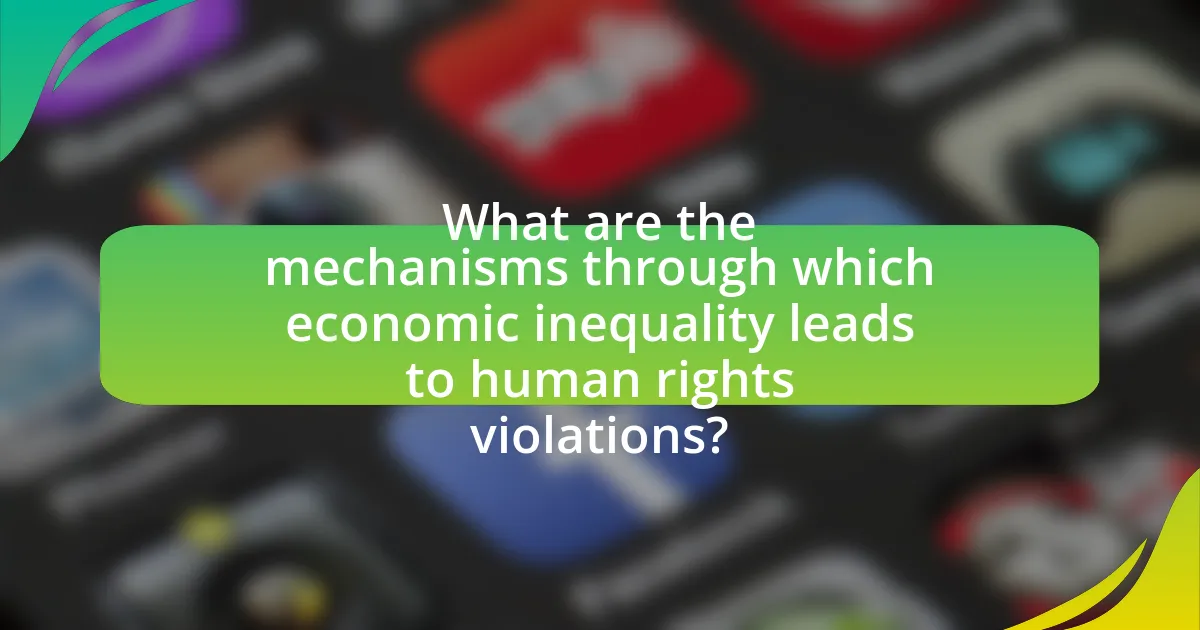
What are the mechanisms through which economic inequality leads to human rights violations?
Economic inequality leads to human rights violations primarily through systemic marginalization, lack of access to resources, and weakened political power among disadvantaged groups. Systemic marginalization occurs when economically disadvantaged populations are excluded from decision-making processes, resulting in policies that do not address their needs. For instance, the United Nations Development Programme highlights that income inequality can limit access to education and healthcare, which are essential for the realization of human rights.
Additionally, lack of access to resources, such as clean water, housing, and employment opportunities, directly impacts the ability of individuals to exercise their rights. The World Bank reports that in countries with high economic inequality, marginalized groups often face barriers that prevent them from accessing basic services, leading to violations of their rights to health and well-being.
Weakened political power among economically disadvantaged groups further exacerbates human rights violations. When wealth is concentrated, those with economic power can influence legislation and policy to protect their interests, often at the expense of marginalized communities. Research by the International Labour Organization indicates that economic inequality can lead to social unrest and conflict, which often results in further human rights abuses, including violence and repression against dissenting voices.
How does poverty impact access to basic human rights?
Poverty significantly restricts access to basic human rights, including the rights to health, education, and adequate living standards. Individuals living in poverty often lack the financial resources necessary to secure essential services such as healthcare and education, which are fundamental human rights recognized by international treaties like the Universal Declaration of Human Rights. For instance, according to the World Bank, over 700 million people live on less than $1.90 a day, limiting their ability to access clean water, nutritious food, and quality education, thereby perpetuating cycles of inequality and human rights violations.
What are the effects of poverty on education and health rights?
Poverty significantly undermines education and health rights by limiting access to quality schooling and essential healthcare services. Individuals living in poverty often face barriers such as inadequate resources, lack of transportation, and insufficient funding for schools, which leads to lower educational attainment and higher dropout rates. According to UNESCO, children from low-income families are three times more likely to be out of school compared to their wealthier peers.
In terms of health rights, poverty correlates with increased vulnerability to diseases and limited access to healthcare. The World Health Organization reports that individuals in low-income communities experience higher rates of chronic illnesses and have less access to preventive care, resulting in poorer health outcomes. This cycle perpetuates inequality, as lack of education and poor health further entrench individuals in poverty, illustrating the profound impact of economic disparity on fundamental human rights.
How does lack of economic resources limit political participation?
Lack of economic resources significantly limits political participation by creating barriers to access and engagement in the political process. Individuals with insufficient financial means often struggle to afford basic necessities, which detracts from their ability to participate in political activities such as voting, campaigning, or attending town hall meetings. For instance, a study by the Pew Research Center found that lower-income individuals are less likely to vote compared to their higher-income counterparts, with economic constraints leading to lower levels of civic engagement. Additionally, the inability to contribute financially to political campaigns or advocacy groups further marginalizes these individuals, reducing their influence on policy decisions and representation.
What role do governments play in perpetuating economic inequality?
Governments play a significant role in perpetuating economic inequality through policies that favor the wealthy and systemic neglect of marginalized communities. For instance, tax policies often disproportionately benefit high-income individuals and corporations, as seen in the United States where the Tax Cuts and Jobs Act of 2017 primarily reduced taxes for the wealthy, exacerbating income disparity. Additionally, governments may underfund social services such as education and healthcare, which disproportionately affects low-income populations, limiting their economic mobility. Research from the Organisation for Economic Co-operation and Development (OECD) indicates that countries with higher levels of social spending tend to have lower income inequality, highlighting the impact of government action or inaction on economic disparities.
How do policies contribute to or mitigate economic disparities?
Policies significantly contribute to or mitigate economic disparities by shaping access to resources, opportunities, and protections. For instance, progressive taxation policies can redistribute wealth, reducing income inequality, while social welfare programs provide support to low-income individuals, enhancing their economic stability. Conversely, regressive policies, such as tax cuts for the wealthy or reduced funding for public services, can exacerbate disparities by concentrating wealth and limiting access to essential services for marginalized populations. Historical data shows that countries with strong social safety nets, like the Nordic nations, exhibit lower levels of economic inequality compared to those with minimal intervention, such as the United States. This evidence underscores the critical role of policy design in either bridging or widening economic gaps.
What are the consequences of corruption on human rights?
Corruption significantly undermines human rights by facilitating abuse of power, eroding the rule of law, and perpetuating inequality. When public officials engage in corrupt practices, they prioritize personal gain over the welfare of citizens, leading to violations of rights such as access to justice, freedom of expression, and the right to participate in governance. For instance, Transparency International’s Corruption Perceptions Index indicates that countries with high levels of corruption often experience systemic human rights abuses, as resources meant for public services are misappropriated, leaving vulnerable populations without essential support. This correlation highlights how corruption not only fosters an environment of impunity but also exacerbates economic inequality, further marginalizing those whose rights are already at risk.
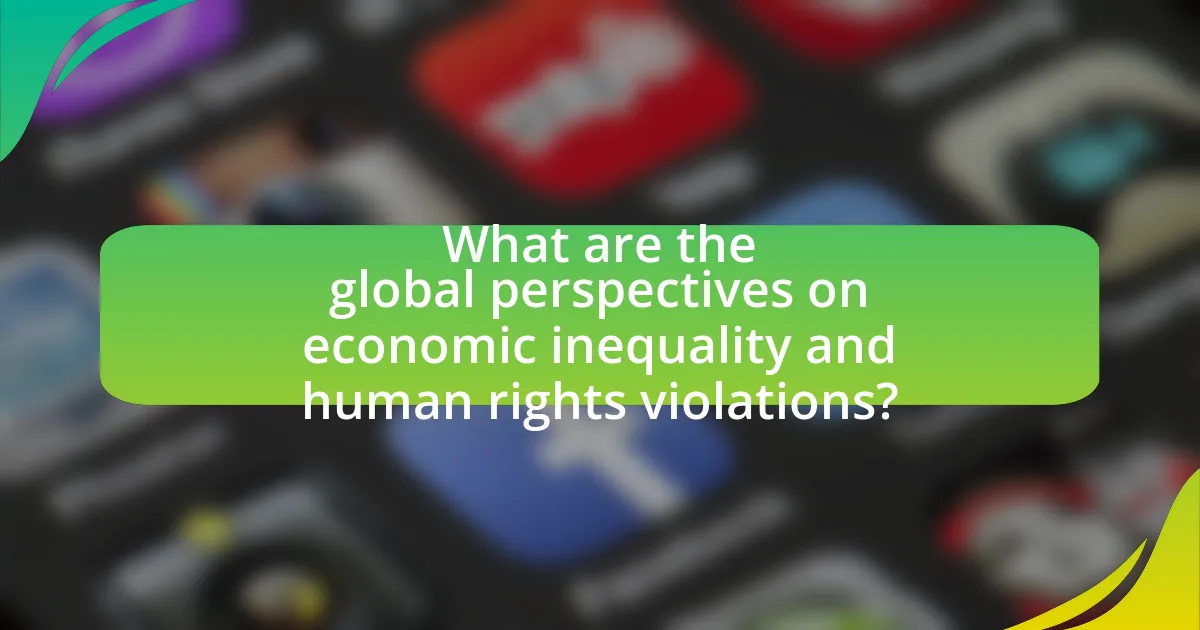
What are the global perspectives on economic inequality and human rights violations?
Global perspectives on economic inequality and human rights violations indicate a strong correlation between the two issues, with many experts asserting that high levels of economic disparity often lead to increased human rights abuses. For instance, the United Nations Development Programme (UNDP) highlights that countries with significant income inequality tend to experience higher rates of social unrest and political instability, which can exacerbate violations of civil and political rights. Additionally, the World Bank reports that economic inequality can hinder access to essential services, such as education and healthcare, disproportionately affecting marginalized communities and perpetuating cycles of poverty and discrimination. These findings underscore the interconnectedness of economic inequality and human rights, suggesting that addressing one issue is crucial for mitigating the other.
How do different countries address the connection between these issues?
Different countries address the connection between economic inequality and human rights violations through various policies and frameworks aimed at promoting social justice and equitable resource distribution. For instance, Scandinavian countries like Sweden and Norway implement comprehensive welfare systems that provide universal healthcare, education, and social security, which help mitigate economic disparities and protect human rights. In contrast, countries such as the United States have seen significant debates around healthcare access and income inequality, leading to movements advocating for reforms to address systemic injustices. Research by the United Nations Development Programme highlights that nations with lower income inequality tend to have better human rights outcomes, demonstrating the importance of addressing economic disparities to uphold human dignity and rights.
What successful strategies have been implemented in various nations?
Various nations have successfully implemented strategies such as progressive taxation, universal basic income, and social safety nets to address economic inequality and its connection to human rights violations. For instance, Sweden employs a high progressive tax system that funds extensive welfare programs, resulting in lower income inequality and improved access to education and healthcare. Similarly, Finland’s implementation of universal basic income trials has shown positive effects on reducing poverty and enhancing individual well-being. These strategies have been supported by research indicating that nations with lower economic inequality tend to experience fewer human rights violations, as evidenced by the Human Development Index rankings, where countries with robust social policies rank higher in human rights protections.
How do international organizations influence national policies?
International organizations influence national policies primarily through mechanisms such as funding, technical assistance, and the establishment of international norms. For instance, organizations like the World Bank and the International Monetary Fund provide financial resources to countries, often tied to specific policy reforms aimed at reducing economic inequality and promoting human rights. These organizations also offer expertise and best practices that help shape national policies in areas such as social welfare, labor rights, and governance. Furthermore, international treaties and agreements, facilitated by organizations like the United Nations, create binding commitments for countries to uphold human rights standards, thereby directly impacting national legislation and policy frameworks.
What can individuals and communities do to combat economic inequality and promote human rights?
Individuals and communities can combat economic inequality and promote human rights by advocating for policy changes that ensure equitable access to resources and opportunities. For instance, supporting living wage initiatives can help reduce income disparities, as research shows that raising the minimum wage can lift many workers out of poverty. Additionally, communities can organize local campaigns to raise awareness about human rights issues, fostering a culture of respect and equality. Engaging in collective bargaining and supporting labor unions can empower workers to negotiate fair wages and benefits, further addressing economic inequality. Furthermore, individuals can contribute to local charities and organizations that focus on education and job training, which are essential for breaking the cycle of poverty. These actions collectively contribute to a more just society where economic inequality is diminished, and human rights are upheld.
What grassroots movements have made an impact?
Grassroots movements that have made an impact include the Civil Rights Movement, the Women’s Suffrage Movement, and the Black Lives Matter movement. The Civil Rights Movement, particularly in the 1960s, successfully challenged racial segregation and discrimination in the United States, leading to significant legislative changes such as the Civil Rights Act of 1964. The Women’s Suffrage Movement, which culminated in the 19th Amendment in 1920, granted women the right to vote, fundamentally altering the political landscape. The Black Lives Matter movement, initiated in 2013, has raised awareness about systemic racism and police violence, influencing public discourse and policy reforms. Each of these movements has demonstrated the power of collective action in addressing economic inequality and human rights violations.
How can advocacy and education play a role in this fight?
Advocacy and education are crucial in addressing economic inequality and human rights violations by raising awareness and mobilizing action. Advocacy efforts can influence policy changes that promote social justice, as seen in movements like the Fight for $15, which successfully pushed for higher minimum wages in various states, directly impacting economic disparities. Education empowers individuals with knowledge about their rights and the systemic issues contributing to inequality, fostering informed communities that can challenge injustices. Research from the United Nations Development Programme highlights that educated populations are more likely to engage in civic activities, leading to stronger advocacy for human rights protections. Thus, advocacy and education serve as foundational tools in the fight against economic inequality and its associated human rights violations.
What are the best practices for addressing economic inequality and human rights violations?
To address economic inequality and human rights violations effectively, implementing comprehensive policy reforms is essential. These reforms should include progressive taxation, which redistributes wealth and reduces income disparities, as evidenced by countries like Sweden, where high tax rates fund extensive social services that promote equality. Additionally, enforcing labor rights through stronger regulations ensures fair wages and safe working conditions, as demonstrated by the International Labour Organization’s standards that have improved labor conditions globally. Furthermore, investing in education and healthcare access empowers marginalized communities, leading to greater economic participation and reduced inequality, as shown in studies by the World Bank indicating that education significantly boosts economic mobility. Lastly, fostering inclusive economic growth through support for small and medium enterprises can create jobs and stimulate local economies, thereby addressing both economic inequality and human rights violations.
